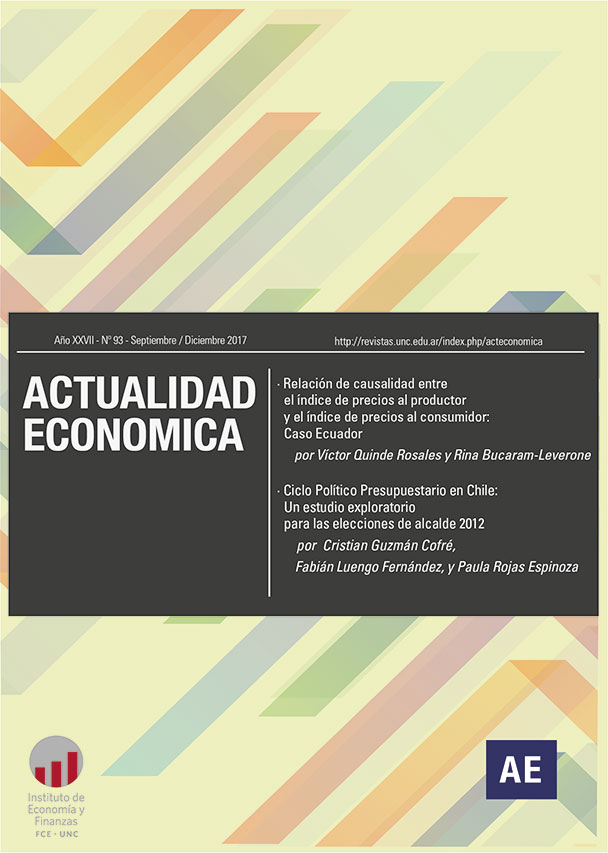Budgetary policy cycle in Chile: An exploratory study for the 2012 mayor elections
Keywords:
Budgetary policy cycle, Political Economy, Municipal ElectionsAbstract
The objective of this research is to explore the existence of budgetary political cycles at municipal level in Chile. As stated in the literature, the existence of budgetary policy cycle encourages / motivates a politician in exercise to modify the structure of expenditure with the objective of obtaining re-election in office. In the case of the elections of mayor of Chile in 2012, we made a cross-section estimation and the results show a positive relationship of the municipal spending of the 2 years prior to the election over the vote received by an incumbent. In addition, the previous vote of the incumbent and the membership of a political coalition affect the percentage of votes received.
Downloads
References
Balaguer-Coll, M. y Brun-Martos, M.(2013). “El efecto del gasto público sobre las posibilidades de reelección en los gobiernos locales”. Revista de contabilidad – Spanish Accounting Review 16 (1), pp. 74-80.
Bonfiglioni, A., y Garcia, G. (2013). “Uncertainty, electoral incentives and political myopia”. The Economic Journal, vol. 123, nº 568, pg 373 - 400.
Cerda, R. y Vergara, R. (2008). “Government subsidies and presidential election outcomes: evidence for a developing country”. World Development, 36(11), pp. 2470 - 2488.
Eslava, M. (2006). “Ciclo políticos de la política fiscal con votantes opuestos al déficit: el caso Colombiano”. El Trimestre Económico, vol. LXXIII, nº 290, pp. 289 - 336.
Eslava, M. (2011). “The political economy of fiscal deficits: a survey”. Journal of Economic Surveys, vol. 25, nº 4, pp. 645 – 673.
Gámez, C. y Amarilla, V. (2011). “Política económica o economía política: el ciclo presupuestal en México”. Revista Cofactor, vol 2, nº 3.
Jones, M. Meloni, O. y Tommasi, M. (2012). “Voters as fiscal liberals: Incentives and accountability in federal systems”. Economics & Politics, vol. 24, nº 2, pp. 135 – 156.
Kraemer, M. (1999). “¿Qué está provocando los ciclos económicos presupuestarios en América Latina y el Caribe?”. El Trimestre Económico, LXVI (1), n. 261, pp. 3-34.
Meloni, O. (2001). “Gobernadores y elecciones: ¿es “negocio” ser austero? Evidencia a partir de datos de panel”. XXXVI Reunión Anual de la Asociación Argentina de Economía Política.
Nordhaus, W. (1974). “The political bussines cycle”. The Review of Economic Studies, vol. 42, nº 2, pp. 169 - 190.
Núñez, D. (2007). “Impacto del gasto total municipal en el resultado de un alcalde que se presenta a la reelección”. Tesis de Grado. Magíster de Economía. Pontificia Universidad Católica de Chile.
Streb, J., Lema, D. y Garofalo, P. (2012). “Temporal Aggregation in political cycle”. Journal of the Latin American and Caribbean Economic Association, vol. 13, nº 1, pp. 39-78.
Tabellini, G., Alesina , A. (1990). “Voting on the budget deficit”. The American Economic Review, vol. 80, nº 1, pp. 37 - 49.
Veiga, F., y Veiga, L (2007). “Political business cycle at the municipal level”. Public Choice, vol. 131, nº 2, pp. 45 – 64.
Downloads
Published
Issue
Section
License
Those authors who have published with this journal, accept the following terms:
Authors will conserve their copyright and guarantee the magazine the right of first publication of their work, which will be simultaneously subject to the Creative Commons Attribution-NonCommercial-NoDerivative 4.0 International License that allows third parties to share the work as long as the author and first publication of this magazine are indicated.
Authors may adopt other non-exclusive license agreements to distribute the published version of the work (e.g., deposit it in an institutional telematic archive or publish it in a monographic volume) provided that the initial publication in this journal is indicated.
Authors are allowed and encouraged to disseminate their work through the Internet (e.g., in institutional telematic archives or on their website) before and during the submission process, which may lead to interesting exchanges and increase citations of the published work. (See The effect of open access)









